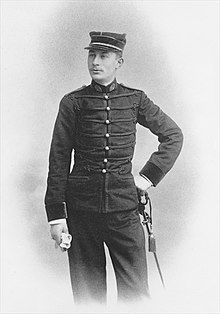Ernest Duchesne
Ernest Duchesne (born May 30, 1874 in Paris , France , † April 12, 1912 in Amélie-les-Bains-Palalda ) was a French military doctor and is considered to be the first to discover the antimicrobial effectiveness of mold .
Life
In 1894 Duchesne entered the Military Academy of Lyon ( Ecole du Service de Santé Militaire de Lyon on). Duchesne completed a year-long internship in Val-de-Grâce before being promoted to Second Class Medical Major of the 2nd Hussar Regiment of Senlis. In 1901 he married Rosa Lassalas from Cannes . However, his wife died of tuberculosis just two years later . In 1904 Duchesne fell ill with a lung disease, probably also tuberculosis. Three years later he was discharged from the army and sent to a sanatorium in Amélie-les-Bains. There he died on April 12, 1912 at the age of 37. He is buried next to his wife in the Cimetière du Grand Jas cemetery in Cannes.
Scientific work
Thirty years before Alexander Fleming , the discoverer of penicillin , Duchesne made the observation that certain molds have antibiotic - i.e. bacteria- killing - properties.
In his research he was helped by the observation that the Arab grooms employed in the military hospital kept the saddles for the horses in a dark, damp room in order to encourage the formation of mold. When Duchesne asked why they were doing this, the stable boys replied that it would heal more quickly the wounds caused by chafing the saddle. Duchesne then prepared a solution from these molds and injected it into several sick guinea pigs . It was found that all test animals recovered after the injection.
Duchesne then studied the interaction between Escherichia coli and Penicillium glaucum in a series of meticulous experiments. It turned out that in a culture that contained only these two species, the fungus was able to eliminate the bacterium. Furthermore, it was shown that an experimental animal that had been inoculated with a typhus bacillus in a normally fatal dose showed no signs of disease and was therefore completely healthy - provided that it had also been inoculated with Penicillium glaucum beforehand (in this respect the results differ von Duchesne therefore depends on the results of Fleming: the strain Penicillium notatum discovered by Fleming showed no effects on typhus).
His doctoral thesis entitled “Contribution à l'étude de la concurrence vitale chez les micro-organismes: antagonisme entre les moisissures et les microbes” (“Investigations on the struggle for survival of microorganisms: the antagonism of molds and microbes”), which he wrote in Submitted in 1897 to obtain a doctorate , was the first scientific work to deal with the possibilities of therapeutic use of molds due to their antimicrobial properties. At the time, the Pasteur Institute rejected the doctoral thesis that had been submitted by the then completely unknown and just 23-year-old. Duchesne pushed for more research, but military service prevented him from developing further activities in this area.
Honor
In 1949, five years after Alexander Fleming received the Nobel Prize , Duchesne was also posthumously honored by the French Académie nationale de Médecine for his services in the field of microbiology .
Web links
| personal data | |
|---|---|
| SURNAME | Duchesne, Ernest |
| ALTERNATIVE NAMES | Duchesne, Ernst |
| BRIEF DESCRIPTION | French doctor, co-discoverer of antibiosis |
| DATE OF BIRTH | May 30, 1874 |
| PLACE OF BIRTH | Paris , France |
| DATE OF DEATH | April 12, 1912 |
| Place of death | Amélie-les-Bains-Palalda , France |
